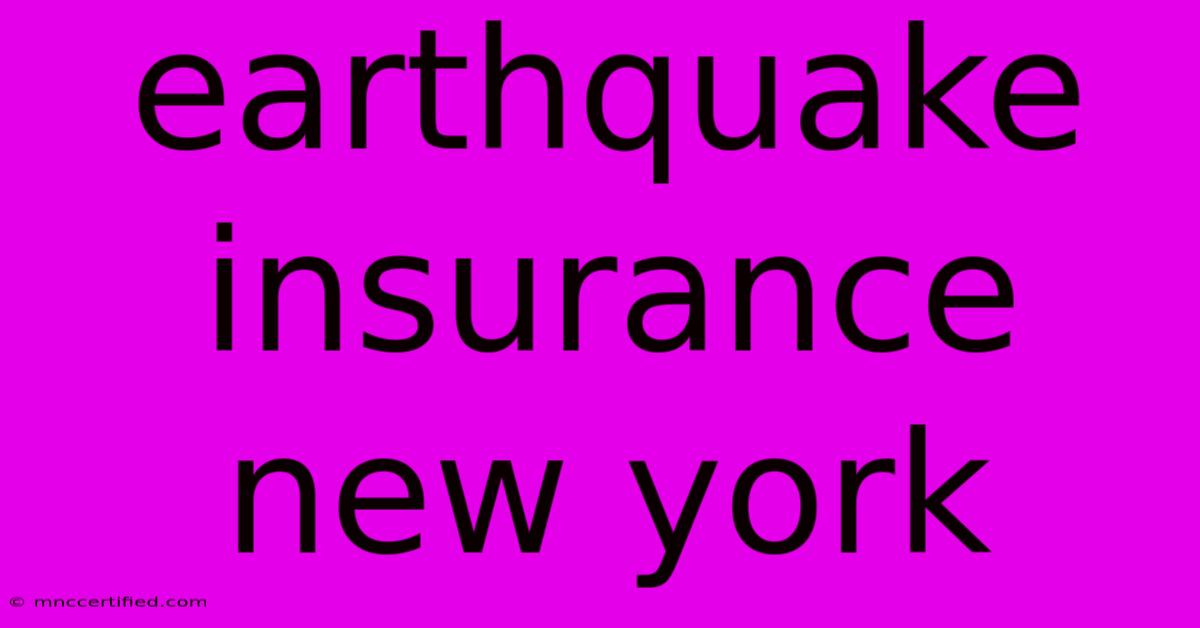Earthquake Insurance New York

Table of Contents
Earthquake Insurance in New York: A Comprehensive Guide
New York, while not situated on a major fault line like California, still experiences seismic activity. While the risk might seem lower, the potential for damage from even a moderate earthquake is significant, especially considering the age and density of many buildings in the state. This comprehensive guide explores earthquake insurance in New York, outlining what it covers, who needs it, and how to find the best policy.
Do I Need Earthquake Insurance in New York?
The short answer is: it depends. While the risk of a major earthquake in New York is lower than in California, the potential financial consequences of even a minor quake can be devastating. Consider these factors:
- Location: While the risk is lower statewide, certain areas of New York might be slightly more prone to seismic activity. Researching your specific location's seismic risk is crucial.
- Type of Home: Older buildings, those made of unreinforced masonry, and those located on unstable ground are more vulnerable to earthquake damage.
- Financial Situation: Can you afford to rebuild or repair your home without insurance if an earthquake strikes? This is the most important consideration. Earthquake damage is rarely covered by standard homeowner's insurance.
While not mandatory, earthquake insurance provides crucial financial protection against a potentially catastrophic event. The cost of rebuilding or repairing significant earthquake damage can far exceed the cost of premiums.
What Does Earthquake Insurance Cover in New York?
Earthquake insurance policies typically cover damage to your home's structure and its contents, including:
- Foundation cracks and shifting: This is often the most costly aspect of earthquake damage.
- Wall and roof damage: Cracks, collapses, and other structural issues.
- Interior damage: Broken windows, damaged appliances, and other interior components.
- Personal belongings: Damage to furniture, clothing, and other personal property.
However, there are usually exclusions and limitations. Policies may not cover damage from landslides or floods triggered by an earthquake, for instance. It's essential to carefully review your policy's terms and conditions to understand exactly what's covered.
Finding the Right Earthquake Insurance Policy in New York
Several factors influence the cost and coverage of earthquake insurance in New York:
- Location: Your home's proximity to fault lines impacts the premium.
- Home Value: The higher the value of your home, the more expensive the insurance.
- Coverage Amount: The amount of coverage you choose affects your premium.
- Deductible: A higher deductible will result in lower premiums, but you'll pay more out-of-pocket in the event of a claim.
Shopping around and comparing quotes from multiple insurers is essential. Use online comparison tools or contact insurance agents directly to find the best policy for your needs and budget. Don't hesitate to ask questions and clarify any uncertainties about coverage and exclusions.
Tips for Choosing an Earthquake Insurance Policy:
- Understand your deductible: A higher deductible means lower premiums, but you'll pay more out-of-pocket in a claim.
- Consider the coverage limits: Ensure the coverage limit is sufficient to rebuild or repair your home and replace your belongings.
- Read the fine print: Carefully review the policy documents to understand the coverage details and exclusions.
- Check the insurer's financial stability: Choose a financially sound insurer with a good track record.
The Importance of Preparation Beyond Insurance
While earthquake insurance offers crucial financial protection, preparedness is equally important. Take steps to:
- Secure heavy objects: Prevent items from falling and causing injury or damage during an earthquake.
- Create an emergency plan: Develop a plan for evacuation and communication in case of an earthquake.
- Stock an emergency kit: Keep a supply of essential items, such as water, food, and first-aid supplies.
Earthquake insurance is a vital component of a comprehensive risk management strategy for New York homeowners. By understanding the risks, comparing policies, and taking proactive steps, you can protect yourself and your property from the financial consequences of an earthquake. Remember to consult with an insurance professional to determine the best coverage for your specific circumstances and location within New York State.

Thank you for visiting our website wich cover about Earthquake Insurance New York. We hope the information provided has been useful to you. Feel free to contact us if you have any questions or need further assistance. See you next time and dont miss to bookmark.
Featured Posts
-
Arizona Mobile Home Insurance
Nov 29, 2024
-
Misfits Gib Defeats Slim Decisively
Nov 29, 2024
-
Phillips Reveals Alzheimer S Shares Fears
Nov 29, 2024
-
Cv Mason Insurance Bristol Ct
Nov 29, 2024
-
Khalife Found Guilty Iran Espionage
Nov 29, 2024